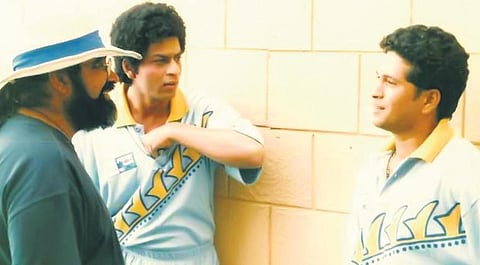

Arrey, it took me two and a half years to write the damn thing. My wife whipped me into doing it, during Covid,” says Prahlad Kakar, the 75-year-old legendary ad filmmaker, of his memoir, Adman Madman (HarperCollins). There is never a dull moment with Kakar, the man behind some of the most memorable brand-building campaigns and award-winning commercials in Indian advertising. The book is, quite aptly subtitled, ‘Unapologetically Prahlad’. From being kicked out of playschool at five “for being at the right place at the wrong time” to gifting swamis at Sadhguru’s Isha ashram “I survived Yoga Marga” T-shirts, the no-holds-barred memoir chronicles a life lived intensely. Adman Madman offers an intimate glimpse, through the bespectacled and ever-curious eyes of Kakar, into the backstage of the Indian advertising establishment, where many a star was born, and also into the workings of a mind that is always teeming with way out-of-the-box ideas and “non-vegetarian jokes”.
Kakar is a difficult man to define. He is a jack of all trades and, indeed, a master of many of them. From cooking food for huge film crews to selling Chattisgarhi sandals on a London street, he has been there and done that. A great lover of hats, horses and guns, he set up Lacadives, the first scuba-diving school in India, in 1993. “I have always involved myself fully in things that have interested me,” he says. “If you have a khujalee (itch), you have to scratch it.” As a schoolboy, Kakar struggled with his studies. He says that he escaped his physics and chemistry classes by daydreaming. It was only much later in life that he was diagnosed as a dyslexic. The anxieties of his parents and teachers, which were many, however, never got to him, as he was quite often lost in his imaginary worlds. He did not want to ‘fit in’. “As far as I was concerned, rules were meant to be broken,” he says.
Kakar kick-starts
In 1971, Kakar arrived in Mumbai, then Bombay, from Delhi, with a “princely sum” of Rs 300 in his pocket, hoping to start a career in ad filmmaking. It was a time when televisions were becoming ubiquitous and the print media was losing in popularity, especially for advertising. He started work under the tutelage of none other than Shyam Benegal, already an established figure in the advertisement circles and who would go on to become one of the most acclaimed of the country’s filmmakers of the ’70s . Kakar describes Benegal as his “reluctant guru”. He explains: “In Bombay, nobody trusts people from Delhi. They feel Delhiites are all jugaadus. He was very skeptical of my commitment and thought that I wouldn’t last. But I did.” Signing up as a “slave” to Benegal, Kakar picked up the trade, constantly biting the proverbial bullet.
Anticipating Murphy
“Creativity is irrational. What kick-starts the irrational brain is pressure,” says Kakar. Running from pillar to post as a gofer, a term used in advertising circles for someone who is made to run errands, Kakar was introduced to Murphy’s law, which he swears by to this day. “Anything that can go wrong, will go wrong,” states the law. “I have a lifelong relationship with Murphy. He sits on my shoulders, waiting for a chance to pee in my ears,” he says. The book is replete with ad-making anecdotes where Murphy shows up time and again. Kakar recounts a shoot for the relaunch of Kawasaki Bajaj’s bike RTZ 100 that took place in the middle of nowhere in Rajasthan. It was a desperate shoot. The set was submerged in sand, after a sandstorm the previous night. The steam-engine train that was arranged with great difficulty derailed before reaching the set. All this in sweltering heat. Kakar remembers it as one of the days when Murphy struck mercilessly. The book details the beginning of Genesis, Kakar’s production house, now one of the oldest and foremost ad-film production houses in the country. It produced some of the most successful advertisements for clients, including Nestle and PepsiCo. Kakar remembers the day when a young lady with “grey-green eyes” walked into the office in Mumbai, wanting to be a part of the cast in a Pepsi ad. That young lady was Aishwarya Rai.
A philosophy of fun
Humour is Kakar’s guiding philosophy, and a gut feeling is way more important for him than deliberation. It is very important to be funny, he says, especially for someone who does not go by the book. “You can break the rules. But the important thing is not to get caught. And humour helps,” he laughs. His brand of irreverent humour has been much sought after in the industry. “If a brand can laugh at itself, it means it is confident about itself. And that makes it successful,” he says.Adman Madman is a memoir that chronicles the hopes and heartbreaks, both romantic and professional, of one of the doyens of Indian advertising. It is the self-professedly “mad” adman opening himself up, revealing a tender and discerning personality, and who always laughs at himself first so that he can “afford to laugh at others”.